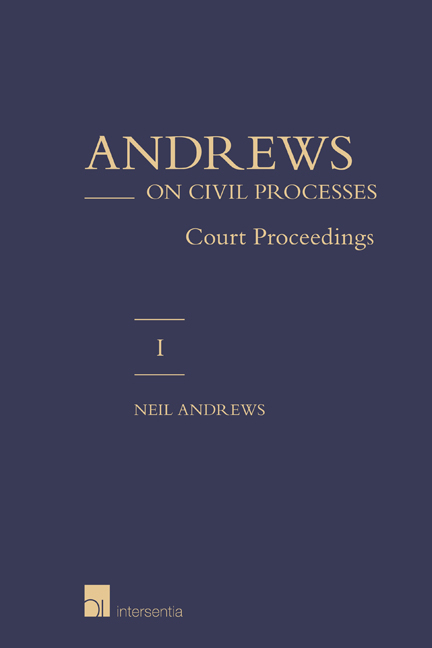Book contents
- Frontmatter
- Dedication
- Epigraph
- Preface
- Contents
- Table of Cases
- Table of Statutes
- Table of Statutory Instruments
- PART I INTRODUCTION TO THE FORMS OF CIVIL JUSTICE
- Chapter 1 Introduction
- Chapter 2 Sources of English Civil Procedure
- Chapter 3 The Big Picture’: Interaction of the Court System and Other Forms of Dispute Resolution
- PART II COMMENCEMENT OF COURT PROCEEDINGS AND PREPARATION FOR TRIAL
- PART III END-GAME: TRIAL, APPEAL, FINALITY AND ENFORCEMENT
- PART IV COSTS AND FINANCING OF LITIGATION
- PART V SPECIAL PROCEEDINGS
- PART VI PRINCIPLES OF CIVIL LITIGATION
- PART VII THE EUROPEAN CONTEXT
- Select Bibliography
- Index to Volumes I and II
Chapter 3 - The Big Picture’: Interaction of the Court System and Other Forms of Dispute Resolution
from PART I - INTRODUCTION TO THE FORMS OF CIVIL JUSTICE
Published online by Cambridge University Press: 13 December 2017
- Frontmatter
- Dedication
- Epigraph
- Preface
- Contents
- Table of Cases
- Table of Statutes
- Table of Statutory Instruments
- PART I INTRODUCTION TO THE FORMS OF CIVIL JUSTICE
- Chapter 1 Introduction
- Chapter 2 Sources of English Civil Procedure
- Chapter 3 The Big Picture’: Interaction of the Court System and Other Forms of Dispute Resolution
- PART II COMMENCEMENT OF COURT PROCEEDINGS AND PREPARATION FOR TRIAL
- PART III END-GAME: TRIAL, APPEAL, FINALITY AND ENFORCEMENT
- PART IV COSTS AND FINANCING OF LITIGATION
- PART V SPECIAL PROCEEDINGS
- PART VI PRINCIPLES OF CIVIL LITIGATION
- PART VII THE EUROPEAN CONTEXT
- Select Bibliography
- Index to Volumes I and II
Summary
INTRODUCTION
The purpose of this chapter is to note two trends. Neither trend is peculiar to England. First, there has been a sustained attempt to control court proceedings and to render them more efficient. In England the four main manifestations of the struggle to control court litigation and render it more efficient are: (i) an institutional bias against trial (avoidance of trial and promotion of settlement and mediation); (ii) greater use of pre-trial case management by judges; (iii) expanding the ‘no-win, no-fee’ system of remunerating litigation lawyers, and curbing public civil legal aid; and (iv) restrictions on appeals.
But the second trend is that there has been greater resort to non-judicial modes of dispute resolution, notably mediation and arbitration. It is perhaps ironic that despite intense activity aimed at reforming, improving and refining civil proceedings, the demand for alternative sources of civil justice has not abated, but in fact has grown. It does not appear pessimistic, but rather a realistic conclusion rooted in long experience, to declare that modern court systems (sources of ‘public justice’) are unlikely to improve to the point that mediation and arbitration (sources of ‘private justice’) cease to be attractive alternative forms of justice. The pragmatic and positive modern perspective is to accept that the public and private systems are complementary and mutually supportive. It makes sense to speak of a ‘binary system’ of public and private justice. The challenges are to continue to improve all elements of the binary system: enabling the court system to perform better; ensuring that arbitration and mediation are conducted fairly and efficiently; and promoting the harmonious co-existence of – a happy marriage between – the public and private systems.
THE LANDSCAPE OF CIVIL JUSTICE
The Four Forms of Civil Justice: Disputes can be adjudicated by courts, or resolved by arbitration, or settled by mediation, or the parties can spontaneously reach unmediated agreements of settlement. These are the ‘four forms of civil justice’: courts, arbitration, mediation, and (unmediated) settlement.
Mediators, Arbitrators and Judges: Of these ‘four forms’, the first three involve reference to a neutral third party or panel of third parties.
- Type
- Chapter
- Information
- Andrews on Civil ProcessesCourt Proceedings, pp. 43 - 60Publisher: IntersentiaPrint publication year: 2013

